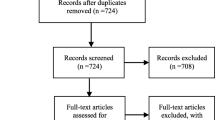Abstract
AIM
To describe a curriculum incorporating written reflection followed by reflective discussion with the goal of enhancing students’ recognition and handling of cross-cultural and health disparity issues in different healthcare delivery settings.
PROGRAM AND SETTING
This required curriculum was implemented within a 4-week family medicine clerkship (n = 188 students, 6 to 12 per rotation) in 23 successive rotations over 2 years. Electronic submission of a written assignment in response to structured questions was followed by in-class discussion in week 4.
PROGRAM EVALUATION
Outcomes were students’ session evaluations, thematic analysis of student responses, and analysis of faculty facilitators’ reflections about discussion sessions. Students’ cultural knowledge about their patients’ health beliefs around diabetes was assessed using multiple choice questions at the beginning and end of the clerkship.
RESULTS
One hundred percent of students submitted narratives. Student evaluations demonstrated high acceptance, appreciation of sessions and faculty. Analyses of written assignments and in-class discussions identified recurring themes. Students achieved greater synthesis and more nuanced understanding of cross-cultural encounters after discussion. Self-rating of confidence in addressing cultural issues after the curriculum was high at 3.17 ± SD 0.57 (1–4). Cultural knowledge scores improved significantly. Core components for success were clerkship director support, required participation, experienced faculty facilitators without evaluative roles, a structured assignment and formal forum for trigger question discussion
DISCUSSION
Written reflection followed by facilitated peer discussion adds value to simple ‘exposure’ to cross-cultural clinical experiences for medical students.


Similar content being viewed by others
References
Smith WR, Betancourt JR, Wynia MK, et al. Recommendations for teaching about racial and ethnic disparities in health and health care. Ann Intern Med. 2007;147(9):654–65.
Kumagai AK, Lypson ML. Beyond cultural competence: critical consciousness, social justice, and multicultural education. Acad Med. 2009;84(6):782–7.
Kagawa-Singer M, Kassim-Lakha S. A strategy to reduce cross-cultural miscommunication and increase the likelihood of improving health outcomes. Acad Med. 2003;78(6):577–87.
Hill CLA, MN PNR. Designing and evaluating interventions to eliminate racial and ethnic disparities in health care. J Gen Intern Med. 2002;17(6):477–86.
Rosen J, Spatz ES, Gaaserud AM, et al. A new approach to developing cross-cultural communication skills. Med Teach. 2004;26(2):126–32.
Reynolds P, Kamei RK, Sundquist J, Khanna N, Palmer EJ, Palmer T. Using the PRACTICE mnemonic to apply cultural competency to genetics in medical education and patient care. Acad Med. 2005;80(12):1107–13.
American Association of Medical Colleges, Tool for Assessing Cultural Competence Training (TACCT). http://www.aamc.org/meded/tacct/start.htm. Accessed November, 2009.
Lie DA, Boker J, Cleveland E. Using the tool for assessing cultural competence training (TACCT) to measure faculty and medical student perceptions of cultural competence instruction in the first three years of the curriculum. Acad Med. 2006;81(6):557–64.
Lie DA, Boker J, Crandall S, DeGannes CN, Elliott D, Henderson P, et al. Revising the Tool for Assessing Cultural Competence Training (TACCT) for curriculum evaluation: Findings derived from seven US schools and expert consensus’. Medical Education Online. July 2008;13. http://www.med-ed-online.org/volume13.php. Accessed November, 2009.
Haidet P, Hatem DS, Fecile ML, Stein HF, Haley HL, Kimmel B, et al. The role of relationships in the professional formation of physicians: case report and illustration of an elicitation technique. Patient Educ Couns. 2008;72(3):382–7.
Street RL Jr, O’Malley KJ, Cooper LA, Haidet P. Understanding concordance in patient-physician relationships: personal and ethnic dimensions of shared identity. Ann Fam Med. 2008;6(3):198–205.
Kelly PA, Haidet P. Physician overestimation of patient literacy: a potential source of health care disparities. Patient Educ Couns. 2007;66(1):119–22.
Shapiro J, Lie DA, Gutierrez D, Zhuang G. That never would have occurred to me”: a qualitative study of medical students’ views of a cultural competence curriculum. BMC Med Educ. 2006;6:31.
Shapiro J, Morrison EH, Hollingshead J. Self-perceived attitudes and skills of cultural competence: a comparison of family medicine and internal medicine residents. Med Teach. 2003;25:327–29.
Branch WT Jr. Use of critical incident reports in medical education. A perspective. J Gen Intern Med. 2005;20(11):1063–7.
Kind T, Everett VR, Ottolini M. Learning to connect: students’ reflections on doctor–patient interactions. Patient Educ Couns. 2009;75(2):149–54.
Fischer MA, Harrell HE, Haley HL, Cifu AS, Alper E, Johnson KM, Hatem D. Between two worlds: a multi-institutional qualitative analysis of students’ reflections on joining the medical profession. J Gen Intern Med. 2008;23(7):958–63.
Strauss A, Corbin J. Basics of Qualitative Research: Grounded Theory Procedures And Techniques. London: Sage; 1990.
Cohn F, Shapiro J, Lie DA, Leung LA, Stephens F, Boker J. Interpreting values conflicts experienced by Obstetrics/Gynecology clerkship students using reflective narrative writing. Acad Med. 2009;84(5):587–96.
Saha S, Komaromy M, Koepsell TD, Bindman AB. Patient-physician racial concordance and the perceived quality and use of health care. Arch Intern Med. 1999;159:997–1004.
Cooper-Patrick L, Gallo JJ, Gonzales JJ, et al. Race, gender, and partnership in the patient-physician relationship. JAMA. 1999;282:583–9.
Fernandez A, Wang F, Braveman M, Finkas LK, Hauer KE. Impact of student ethnicity and primary childhood language on communication skill assessment in a clinical performance examination. J Gen Intern Med. 2007;22:1155–60.
Kumas-Tan Z, Beagan B, Loppie C, MacLeod A, Frank B. Measures of cultural competence: examining hidden assumptions. Acad Med. 2007;82(6):548–57.
Acknowledgements
This project was supported by a grant from the National Institutes of Health (NIH), National Heart, Lung and Blood Institute, award# K07 HL079256-01 “An Integrative, Evidence-based Model of Cultural Competency Training in Latino Health across the Continuum of Medical Education” (2004–9) and from the Association of American Medical Colleges (AAMC) grant initiative “Enhancing Cultural Competence in Medical Schools” (2005–8) supported by the California Endowment. The contents are solely the responsibility of the authors and do not necessarily represent the official views of the NIH or AAMC. The authors gratefully acknowledge the invaluable contributions of Loretta Garcia and Jennifer Encinas for data collection and management, and the support of clerkship director David Morohashi, MD.
Conflict of Interest Statement
None disclosed.
Author information
Authors and Affiliations
Corresponding author
Rights and permissions
About this article
Cite this article
Lie, D., Shapiro, J., Cohn, F. et al. Reflective Practice Enriches Clerkship Students’ Cross-Cultural Experiences. J GEN INTERN MED 25 (Suppl 2), 119–125 (2010). https://doi.org/10.1007/s11606-009-1205-4
Published:
Issue Date:
DOI: https://doi.org/10.1007/s11606-009-1205-4




